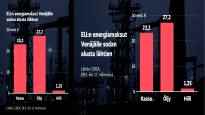On Wednesday, the Commission unveiled a € 300 billion investment plan to prepare for Russia’s hybrid war and disengage from its fossil energy.
Bans on oil and gas imports have proved difficult, but dependence on Russia’s fossil fuels can also be reduced in another way – namely by accelerating the green transition, saving energy and finding new suppliers of gas and oil.
On Wednesday, the Commission proposed a total investment package of EUR 300 billion, with both binding measures and incentives for member states. The aim is to direct the money to renewable energy, ie solar and wind power.
We compiled the contents of the package into five questions.
1. Why is solar power number one?
The Commission wants to significantly increase the share of solar energy in particular, but also of wind farms. With 35% of energy consumption today, it would be 67% in eight years’ time.
– More than half of that increase comes from the roof [aurinkokennoista]Commissioner for Energy Kadri Simson said Wednesday.
The share of the sun as an energy source is set to double by 2025. According to the Commission, the advantage of solar energy is that the panels can be technically installed relatively quickly.
“There’s an elephant in the living room, though, and it’s the permitting process,” Simson said. He pointed out that obtaining a permit to erect wind farms and solar parks may have taken several years.
Permit requirements are now being relaxed to clearly increase wind investment. The Commission considers that the licensing of renewable energies should be successful in less than a year in the future.
Four EU coastal states, namely Germany, Belgium, the Netherlands and Denmark reported (switch to another service) will increase the North Sea offshore wind power by ten times the current EU wind power production in the coming years. The goal is to heat 230 million homes with additional wind power by 2050.
2. What is expected of citizens?
Energy saving is another cornerstone of the Commission’s proposal. The Commission is encouraging citizens to save energy through a separate campaign.
Overall, austerity measures for businesses and citizens could replace 13% of Russia’s gas, oil and coal, the Commission calculates.
If households reduced heating, people drove more economically and, for example, turned off lights in rooms they did not live in, the role of households in eliminating dependence on Russia could according to the Commission (move to another service) be five percent.
3. Why not stop Russian energy imports?
The EU has already punished Russia with five packages of sanctions that prevent, among other things, the country’s decision-makers, oligarchs, companies and banks from operating in Western markets. Imports of coal will be banned from the autumn.
There is now a ban on oil imports at the negotiating table, but two weeks of negotiations have not yet yielded any results. The border is being met with oil and gas, as some Member States are highly dependent on them.
Energy sanctions have remained torsos in the Chief Economist of the Business Delegation EVA Sanna Kurrosen with.
“For example, the delayed import ban on coal is quite insignificant for Russia, which means that the sanctions are currently being lifted,” says Kurronen.
Russia’s abandonment of fossil fuels has proved virtually impossible in the short term. Five different sanctions packages have been decided quickly, but the ban on oil imports came against the border.
Attempts have been made to agree on the oil for two weeks without success.
– Some countries, for example, are 100% dependent on Russian heating oil. They are, of course, in a different situation from those who find alternative solutions more quickly, EU Commissioner for the Internal Market Thierry Breton said in an interview with .
Measures are therefore needed to replace these Russians with alternative energy sources. For example, the construction of new gas pipelines will require around € 10 billion in the coming years, the Commission estimates.
4. Is everyone obliged to participate?
Some of the Commission’s plans would be compulsory for Member States, citizens and businesses, some voluntary.
“Energy ceilings” would become mandatory gradually from 2025 onwards. Solar panels should be installed in both new residential and public buildings from 2029 onwards.
Solar cells should be installed as early as 2025 in all new public buildings of more than 250 square meters.
Member countries should guide the construction and renovation of houses, for example, by using twice as many heat pumps.
The Commission emphasizes that decisions on both the sanctions package and the energy transition will be taken together and that no Member State will be left to fend for itself.
For example, countries in the middle of the continent do not have the option of switching their gas or oil pipelines to sea transport because they do not have ports. The Commission is proposing EUR 2 billion in investment funding for these countries to their satisfaction.
However, Hungary, for example, has demanded a much higher amount of compensation, ie EUR 15-18 billion.
5. How much does the package cost?
The price tag for the investment package will total EUR 300 billion in the coming years. Of this, EUR 72 billion would be direct grants and EUR 225 billion loans to beneficiaries.
The largest investments, more than one hundred billion euros, would be directed to the production of renewable energy sources.
The Commission estimates that the cost of fossil fuels in Russia to European taxpayers is almost € 100 billion a year. That price would therefore be saved every year in the future if Russian energy were released.
The plan is to be financed, among other things, by directing funds from the recovery fund set up for the coronary pandemic to measures to boost Russia’s energy recovery.
In addition, the Recovery Fund still has around EUR 200 billion in undrawn loans. Releasing more emissions trading rights to the market could raise € 20 billion out of the market.
You can discuss the article until Thursday night at 11 p.m.
